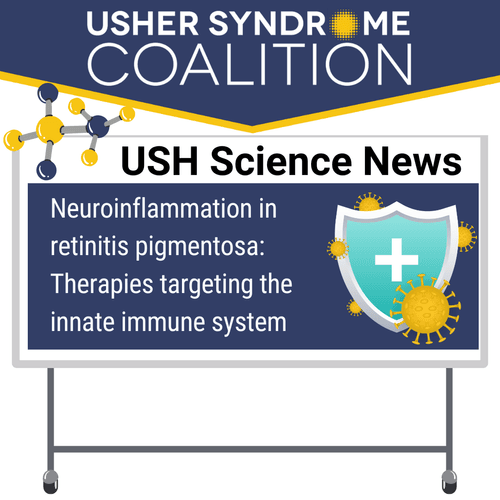Grounded in Science
A balance of research news and well-being for the Usher syndrome community.
Happy December! In our efforts to represent our international USH family, we'd love to know which holiday(s) you recognize. We hope to join you in celebration while sharing the holidays and traditions that make up our global Usher syndrome community.
You can fill out this form to share the cherished holidays and traditions you celebrate.
Starting December 15th, USH Trust registrants will receive quarterly digests of clinical trials and studies that are recruiting. To ensure you receive this information, sign up here and check the box to be included in the USH Trust.
We wish you a joyful holiday season!
Have you joined the Usher Syndrome Coalition Discord Community Server? It’s a safe place for the community to connect with each other. Join here: https://discord.gg/czwHGaDu7W
Research Spotlight
Nanoscope Therapeutics
Nanoscope Therapeutics is a clinical-stage biotechnology company developing gene therapies for retinal degenerative diseases. In March 2023, they announced positive data for their clinical trial named RESTORE (NCT04945772), a phase 2b multicenter, randomized, double-masked, sham-controlled that took place in the U.S. with 18 patients who have advanced retinitis pigmentosa. RESTORE was designed to study the efficacy and safety of a potential gene-agnostic treatment, MCO-010, in adults with RP.
Nanoscope reported: “Results showed vision function improvements after treatment with MCO-010 consistent with previous studies as well as a favorable safety profile.”
MCO-010 has received FDA Fast Track designations and FDA orphan drug designations for both retinitis pigmentosa and Stargardt.
For more, check out our Current USH Research page specific to USH subtype as well as gene-independent therapeutic approaches.
In Case You Missed It: Science News Feature
Neuroinflammation in retinitis pigmentosa: Therapies targeting the innate immune system
October 27, 2022: Retinitis pigmentosa, which is the condition that causes vision loss in patients with Usher syndrome, is caused by mutations in many different genes. Research has shown that inflammation in the cells of the retina is an important contributor to progressive loss of vision in RP. This inflammation is driven by the innate immune system. This study examined several different immune mechanisms: TNFα, TLR, NLRP3, chemokines and JAK/STAT.
TNFα (Tumor necrosis factor alpha) is a signal released by immune cells and is present at high levels in the retina of those with RP. Mouse models have been used to show that reducing TNFα decreases photoreceptor death and improves function. Medications that reduce TNFα are already widely used for diseases like Crohn’s, and therefore testing these medications as therapeutics for RP is warranted.
TLRs (Toll-like receptors) help the body recognise harmful pathogens. TLR activity has been shown to increase retinal degeneration in RP models. Blocking this signaling pathway in mice increased the survival of photoreceptors. Thus, this is another target for potential therapies to treat RP.
NLRP3 is a protein known to be released as a defense against harmful stimuli. Canine models with RP exhibit increased levels of NLRP3. The antioxidant N-acetylcysteine (NAC) reduced this NLRP3 inflammatory response in mouse models of RP and improved survival of rod and cone cells.
Chemokines are another type of signal. Chemokine activity is reduced in RP retinal cell models before the photoreceptor cells begin to degenerate. Increasing chemokine release protects cone cells in mouse models of RP, suggesting that increasing these signals in patients with RP could be beneficial.
A fourth signaling pathway called JAK/STAT is involved in a wide range of functions in the body. Mouse models have indicated that this pathway may be involved in the loss of function in retinal cells seen in RP. There are many drugs that block JAK activity already for various medical conditions. Thus, further research on these drugs as possible therapies for RP is suggested.
Early stage research has also indicated that the gut microbiome may be linked to retinal degeneration. The impact of a high-fat diet on gut microbiology may increase stress on retinal cells.
What this means for Usher syndrome: This paper highlights connections between inflammation and retinitis pigmentosa. Studies have shown that treatments that reduce inflammation could potentially protect the light-sensitive photoreceptor cells from becoming damaged. If these treatments could be proven to work in humans with retinitis pigmentosa, they would be gene agnostic. This means they would have the potential to treat retinitis pigmentosa caused by any type of genetic mutation, including Usher syndrome.
DISCLAIMER: The Usher Syndrome Coalition does not provide medical advice nor promote treatment methods. USH Science News is intended to help summarize more complex literature for the community to use at their own discretion.
For more science news, check out our Science News page, organized by treatment approach and type of Usher syndrome.
On Well-Being: Choosing Hope
Navigating the holiday season can be challenging. It’s important to recognize that maintaining a hopeful outlook during times of stress or uncertainty can be a conscious choice! The benefits of a hopeful mindset have been demonstrated to improve one’s well-being in a number of research studies...
USH Life Hack of the Month
(Send your USH life hacks to info@usher-syndrome.org.)
“For me, TranscribeMe is wonderful because it transcribes all audio I receive on WhatsApp that I don’t understand very well. The way I use it is: I receive the audio, then I forward the audio to the TranscribeMe account (I saved it as a contact in my phone). Then, in the chat of the TranscribeMe “contact,” I get a written transcription of the audio in seconds. It works amazingly, and it works in multiple languages. There are free and paid subscriptions. Hope it helps!”
- Diana, USH Ambassador








